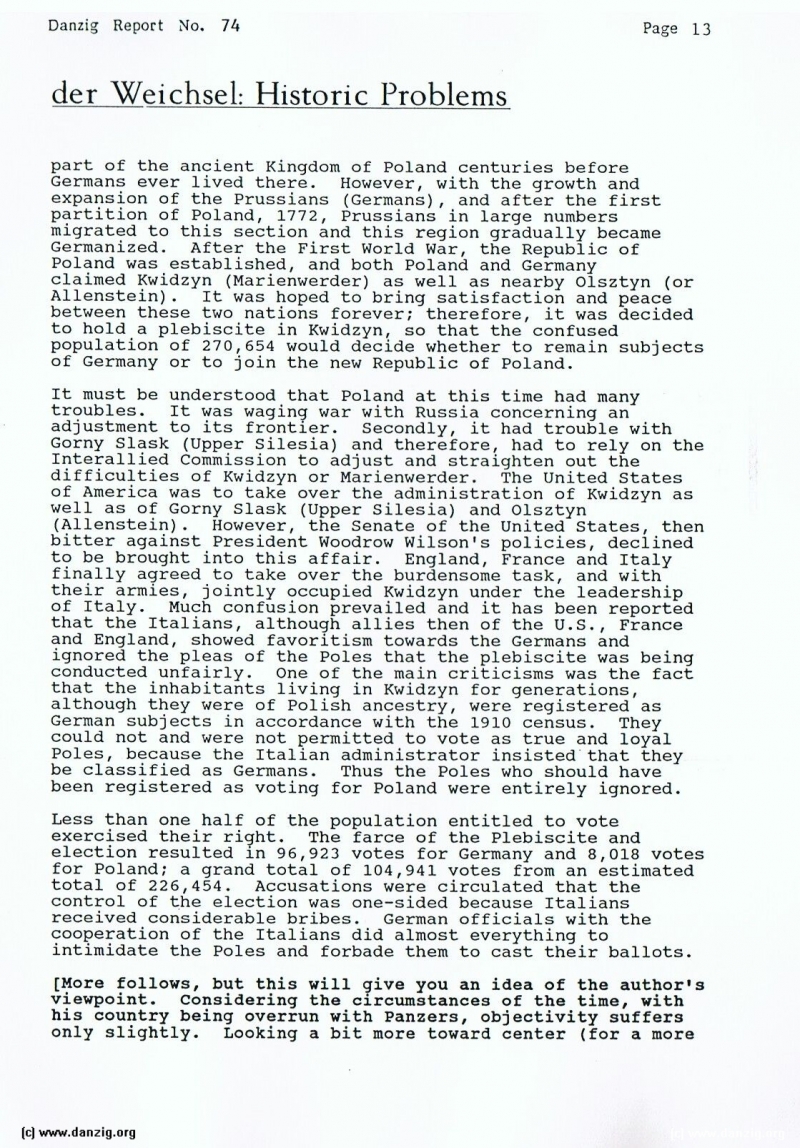
der Weichsel: Historic Problems
part of the ancient Kingdom of Poland centuries before Germans ever lived there. However, with the growth and expansion of the Prussians (Germans), and after the first partition of Poland, 1772, Prussians in large numbers migrated to this section and this region gradually became Germanized. After the First World War, the Republic of Poland was established, and both Poland and Germany claimed Kwidzyn (Marienwerder) as well as nearby Olsztyn (or Allenstein). It was hoped to bring satisfaction and peace between these two nations forever; therefore, it was decided to hold a plebiscite in Kwidzyn, so that the confused population of 270,654 would decide whether to remain subjects of Germany or to join the new Republic of Poland.
It must be understood that Poland at this time had many troubles. It was wagin9 war with Russia concerning an adjustment to its frontier. Secondly, it had trouble with Corny Slask (Upper Silesia) and therefore, had to rely on the Interallied Commission to adjust and straighten out the difficulties of Kwidzyn or Marienwerder. The United States of America was to take over the administration of Kwidzyn as well as of Gorny Slask (Upper Silesia) and Olsztyn (Allenstein). However, the Senate of the United States, then bitter against President Woodrow Wilson’s policies, declined to be brought into this affair. England, France and Italy finally agreed to take over the burdensome task, and with their armies, jointly occupied Kwidzyn under the leadership of Italy. Much confusion prevailed and it has been reported that the Italians, although allies then of the U.S., France and England, showed favoritism towards the Germans and ignored the pleas of the Poles that the plebiscite was being conducted unfairly. One of the main criticisms was the fact that the inhabitants living in Kwidzyn for generations, although they were of Polish ancestry, were registered as German subjects in accordance with the 1910 census. They could not and were not permitted to vote as true and loyal Poles, because the Italian administrator insisted that they be classified as Germans. Thus the Poles who should have been registered as voting for Poland were entirely ignored.
Less than one half of the population entitled to vote exercised their riht. The farce of the Plebiscite and election resulted in 96,923 votes for Germany and 8,018 votes for Poland; a grand total of 104,941 votes from an estimated total of 226,454. Accusations were circulated that the control of the election was one—sided because Italians received considerable bribes. German officials with the cooperation of the Italians did almost everything to intimidate the Poles and forbade them to cast their ballots.
[More follows, but this will ive you an idea of the author’s viewpoint. Considering the circumstances of the time, with his country being overrun with Panzers, objectivity suffers only slightly. Looking a bit more toward center (for a more
Danzig Report Nr. 74 - January - February - March - 1992, Page 13.
Hits: 3759
Added: 01/07/2015
Copyright: 2025 Danzig.org

